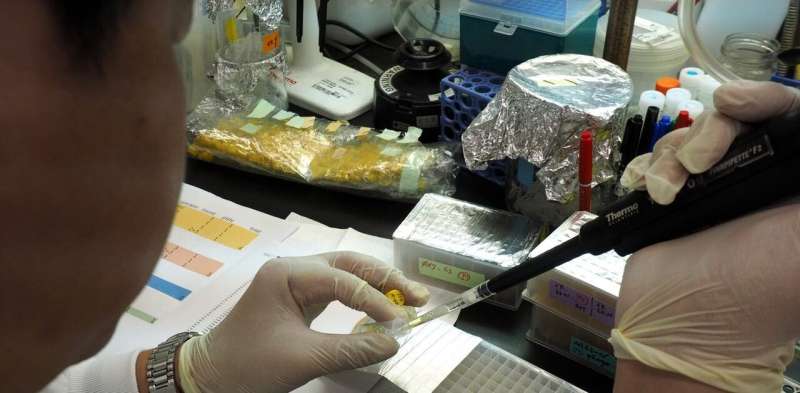Antibody tests: To get a grip on coronavirus, we need to know who's already had it

With much of society now effectively in lockdown, how will we know when it's safe to resume something like normality?
It will largely depend on being able to say who is safe from contracting the coronavirus, officially named SARS-CoV-2, which causes the disease called COVID-19, and who still needs to stay out of harm's way. A blood test to detect who has antibodies against the virus would be a crucial aid.
An antibody test—which would identify those whose immune systems have already encountered the virus, as opposed to current tests that reveal the presence of the virus itself—will be an important part of efforts to track the true extent of the outbreak.
This is because the antibody test will be able to determine whether someone has been infected with virus, even if they haven't shown symptoms.
When we get infected with the novel coronavirus (SARS-CoV-2), one of the ways our immune system fights the virus is by making antibodies. These small molecules bind specifically to SARS-CoV-2 (and not other viruses or bacteria), and combat the infection, mainly by preventing the virus from entering our cells.
Even after we've cleared a particular virus infection, these antibodies stay in our bloodstream, ready to protect us if we encounter the same virus again. This is the principle behind vaccination.
Because antibodies are specific to a particular virus, that means if we can detect SARS-CoV-2 specific antibodies in someone's blood, we know that person has already been infected with the coronavirus.
Scientists in the United States and Europe have already developed specific antibody tests for SARS-CoV-2. Laboratory tests show that only antibodies from SARS-CoV-2 patients will bind to SARS-CoV-2 (and not to the 2003 SARS virus, for example). This tells us the test is specific.
Testing times
Antibody tests are different from the current testing kits used at COVID-19 clinics, which reveal the presence of the virus itself (by detecting its genetic material), rather than our antibodies against it.
That is useful for determining whether someone is currently infected, but cannot spot people who have already fought off the virus. In contrast, the antibody tests won't be able to detect if someone is newly infected with SARS-CoV-2, as it takes our immune system a week or more to make antibodies. So we still need to do the existing tests to accurately diagnose a current infection.
Many companies have developed rapid test kits for detecting anti-SARS-CoV-2 antibodies. The UK is already rolling out 3.5 million antibody tests, while Australia has ordered 1.5 million antibody tests to determine whether patients showing symptoms of fever and cough are infected.
What still needs to be tested is how specific those kits are. It's vital that these antibody test kits are only able to detect antibodies against SARS-CoV-2, and not other coronaviruses or even viruses of other types. Otherwise, people might think they are protected against SARS-CoV-2 when in fact they aren't.
Additionally, because the onset of symptoms may appear within 2-14 days after exposure, a person might test negative to the antibody test but actually be infected. So we really still need to use the two tests together to accurately diagnose patients with COVID-19.
A new test developed by NSW Health Pathology will also be able to determine whether the antibodies in the blood are able to kill the virus. These kinds of tests will help clinicians and scientists measure exactly how soon after infection we develop antibodies, what levels are needed to be protective, and how long these antibodies stay in our body.
This will also help scientists track the spread of the virus and know if someone is going to be immune to reinfection with SARS-CoV-2.
Rapid response
These antibody tests have been developed much more rapidly than vaccines, which are still many months away. This is because the antibody tests are done outside the body, using just a small blood sample, perhaps just a pinprick.
In contrast, a vaccine needs to be injected into the body, so it has to be tested for safety as well as effectiveness.
For a vaccine, we first need to understand how the immune response to the virus itself works, because essentially a vaccine is trying to trick the immune system into thinking it's seen the virus before so it makes protective antibodies. Then, we need to thoroughly test any candidate vaccine to ensure it doesn't make people ill. This means we probably won't see any vaccines for at least 12 months.
The new antibody tests will also help guide vaccine development. By measuring antibody levels in infected and recovered patients, we'll have a much better idea of the levels of protective antibodies a vaccine needs to elicit.
While we wait for a vaccine, the new antibody tests will give scientists, doctors and public health officials much more information about who gets infected, who has already been infected and recovered, and how protected we are against reinfection.
But there is still a long way to go before we can test people's blood for antibodies against SARS-CoV-2 and confidently say it is safe for people to go back to work or into the community without getting sick.
Ultimately it is up to our community leaders and public health officials to decide when it is safe for us to resume normal life.
This article is republished from The Conversation under a Creative Commons license. Read the original article.![]()




















